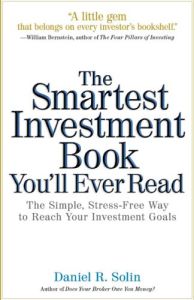Daniel R. Solin’s handy book demonstrates why trading stocks actively is a great idea for your broker or financial advisor, but could be a very bad idea for you and your hard-earned savings. Solin’s investment method, while not presented as a fresh invention, is simple: He encourages you to set up a very low-cost account with a reputable company, allocate your assets in a mix of stock and bond indexes that represent the entire market, and regularly rebalance your portfolio to bring it back in line with your desired asset allocation. Solin’s virtue is his energetic, sometimes entertaining writing style, as displayed in 44 snappy chapters that avoid financial theory almost completely. He focuses on dollars and cents, and how best to keep them in your own pocket. getAbstract recommends this smart guide as a primer for beginners or financially unsophisticated investors.
“Hyperactive” or “Smart” Investing?
Sadly, millions of people believe that their brokers or financial advisors are privy to some secret that enables them to outperform the market, despite a large number of studies that indicate that it just isn’t so. Some financial advisors cleverly market their superior performance over a carefully selected time frame to get you to invest with them. They want to trade your money actively to generate fees for themselves. If you happen to make money as their client, they will entice you to invest more. However, if you lose money, they will point to the small print that says past performance does not guarantee similar future returns. Either way, they still take their fees. Their talk is powerful, but their performance is usually unspectacular.
These “hyperactive” traders generally use either “market timing,” predicting crests and troughs in stock prices, or “stock picking,” choosing undervalued stocks in anticipation that their performance will improve. However, money managers who engage in hyperactive investing cannot consistently beat or time the market. The more expensive, exclusive products they sell are not superior to low-cost ...
Daniel R. Solin, a securities arbitration lawyer and speaker, is a principal at Academic Wealth Management. He also wrote “Does Your Broker Owe You Money?”








Comment on this summary